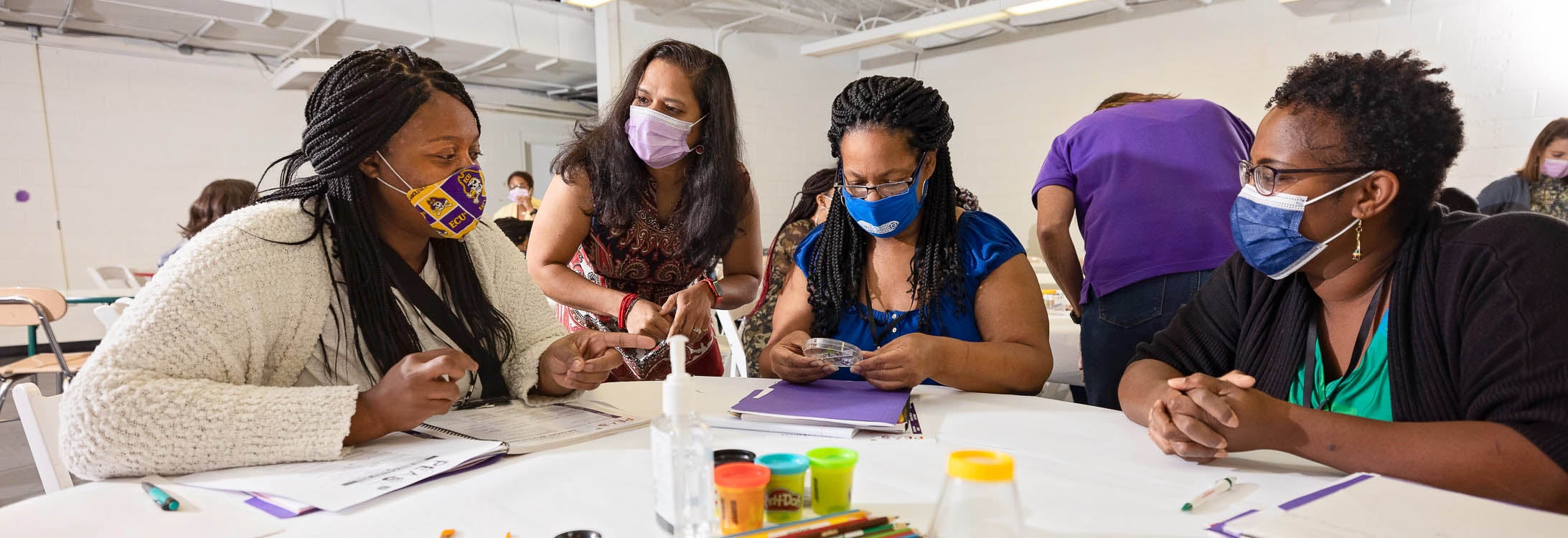STARTING STEM EARLY
ECU programs will give underserved preschoolers a head start in science, health education
If you happened to see Dr. Virginia C. Stage on the ground, digging through the dirt to find roly-polies outside ECU’s Health Sciences Building this past summer, you might not immediately guess that would somehow propel some of the state’s youngest learners toward a healthier lifestyle and a predisposition to futures in STEM.
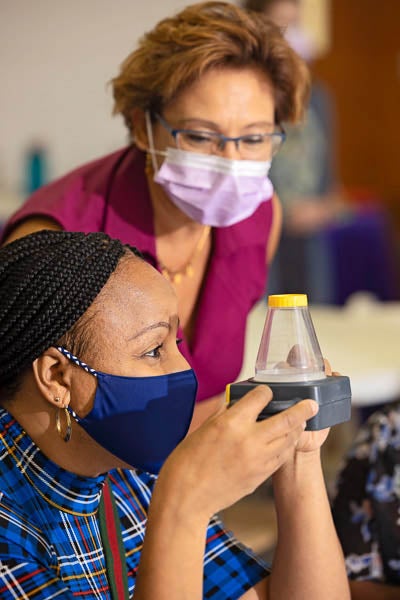
Latorcia Harrell, and UNC Greensboro faculty member Dr. Lucía L. Mendez (standing) examine a pillbug in a magnifier.
Those roly-polies — also known as pillbugs — represent a new emphasis on science exploration for preschool teachers charged with setting the stage for their students’ educations and potentially influencing a lifetime of dietary preferences.
Stage, an associate professor in the College of Allied Health Sciences’ Department of Nutrition Science, is working on two projects that aim to provide underserved preschoolers with improved science and health education to raise their understanding and confidence in those subjects.
“We know children usually make decisions about whether or not they’re going to be in a STEM field by the time they’re in middle school,” Stage said. “So, the earlier we can get to them, the more positive experiences they have with science, the more likely we’re going to have a child that feels like, ‘I can do that too!’”
Stage is the principal investigator for a $1.32 million Science Education Partnership Award (SEPA) funded by the National Institute of General Medical Sciences at the National Institutes of Health (NIH). This project aims to improve science education through Head Start programs across eastern North Carolina, and eventually extend its reach across the state. Stage is also a co-principal investigator for a similar National Science Foundation-funded project aiming to improve science achievement among Latinx preschoolers.
Although most teachers in North Carolina’s Head Start program surveyed reported science was an “important” or “extremely important” priority in their classroom, only a small percentage taught the subject formally, and more than 70% felt that they needed additional materials, curricular resources and training to teach science in their classrooms. Preschool Education in Applied Sciences (PEAS) is designed to give preschool teachers in Head Start classrooms the additional training and resources they lack.
These additional resources are especially needed for children in Head Start programs, which promote school readiness of children under 5 years of age from low-income families.
“Our team understands the important relationship between health and long-term academic achievement,” Stage said. “So, PEAS has a unique focus on integrative education, working to help children develop cognitive and language skills, while also working to improve their dietary quality. In line with the mission of Head Start, our goal is to help prepare children for school and leading a healthy life, so they truly have a head start in kindergarten and beyond.”
Reaching young learners
This school year, the PEAS team is working in 27 classrooms (54 teachers) across five centers that serve 500 low-resource children in Pitt, Martin and Beaufort counties. The teachers converged at ECU for one of four teacher trainings over four days.
The teacher workshops had Stage in the dirt on that August morning, collecting the pillbugs to show participants just how a small, common insect can spark scientific discourse and conversations about how fruits and vegetables grow.
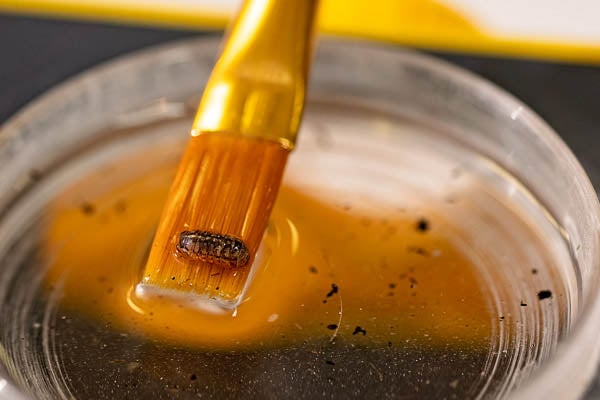
A pillbug, or roly-poly, is lifted out of a water-filled petri dish as part of a training exercise.
“It is important for children to explore the animals and plants that can be found around their home and school. It allows them to interact with and observe components of the ecosystems that impacts them,” said Dr. Tammy Lee, co-investigator and associate professor of science education at ECU. “Roly-polies are common animals that most people are familiar with but maybe do not necessarily think about their impact on ecosystems or using them as part of investigations for students. Students can discuss what types of things they eat and set up experiences in a classroom to answer their questions about these animals.
“Roly-polies are a really nice, observable creature that you can make predictions about,” Lee said. “You can talk about what kinds of things they eat. They’re composters, just like worms, so you can talk about how they use those creatures to recycle foods — just like a compost bin, you can actually use roly-polies for that, believe it or not.”
The teachers were given the creatures to explore, without being told anything about them. Some of them recognized the insects, some didn’t. The PEAS team then shared the process of what science exploration looks like, weaving in how that applies at the preschool level, and how to design projects that also build language skills, nutrition and health education.
Head Start teachers learned to create similar projects for their students that would ignite their curiosity around science and healthy foods. The activities are designed to teach life sciences through the lens of growing food. For instance, children might learn about:
- The conditions required for seeds to grow;
- Which seeds and plants are edible, and which are not; and
- The types of seeds found in fruits and vegetables.
Teachers were also given a toolkit with a teaching guide and $170 worth of science and health-oriented resources.
“Preschool teachers don’t have specialized experience in science,” said Dr. Archana V. Hegde, also a co-investigator on the project and professor of human development and family science. “Teachers know how to teach children in a developmentally appropriate fashion; however, they need to learn the craft and skills to teach science to children, which capitalizes on their interest and also utilizes the steps to science inquiry.”
Throughout the school year, the teachers will take online learning modules designed to provide more direction on teaching science and nutrition to preschoolers, and will get feedback from peers and the PEAS team on their challenges and successes along the way. PEAS coordinators will also speak with Head Start directors via phone regularly and make periodic site visits to observe and learn more about the progress made in the classrooms in person.
Led by Stage and project coordinator Jocelyn Dixon, the PEAS team will collect data on the children’s science learning development and language development, as well as children’s preferences and dietary quality using a tool called a Veggie Meter, which measures skin carotenoid levels and can indicate fruit and vegetable intake.
The team will complete revisions and make improvements to the program next year before the program expands to an additional sixteen centers (50 classrooms) across the state. Stage anticipates the program will reach more than 1,000 children by the end of the grant’s last year.
Related
Grant will give preschoolers head start on learning about science and health
Bilingualtek: Teaching Spanish-speaking preschoolers the language of science
ECU faculty members Drs. Virginia Stage and Tammy Lee are also serving as co-investigators with a Guilford County-based project led by UNC Greensboro Associate Professor Dr. Lucía Mendez that focuses on preschool science and health education through language development.
The NSF project “Bilingualtek: An Integrated Science-Language Instructional Approach for Latinx Preschoolers,” was recently funded for $1.6 million. The researchers will determine what types of science stories resonate most with Latinx children based on their home lives and cultures, and then will develop those into storybooks and activities for children in Spanish and English.
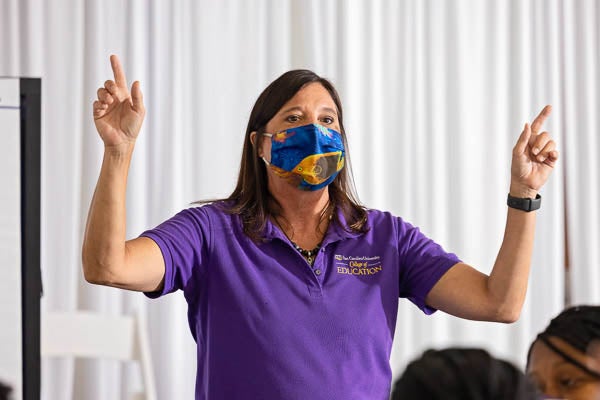
Dr. Tammy Lee, associate professor in the College of Education, leads a portion of the PEAS training.
“The work builds PEAS’ ‘Science Cycle of Discovery’ which uses evidenced-based practice and the Next Generation Science Standard to guide how science is taught in preschool,” Stage said. “In our NSF intervention, however, there is a more intense intervention on language development, especially for ESL (English as a Second Language) children. The ultimate goal is to help children develop their language skills around science so that they can be more confident and ready to learn science in the early years.”
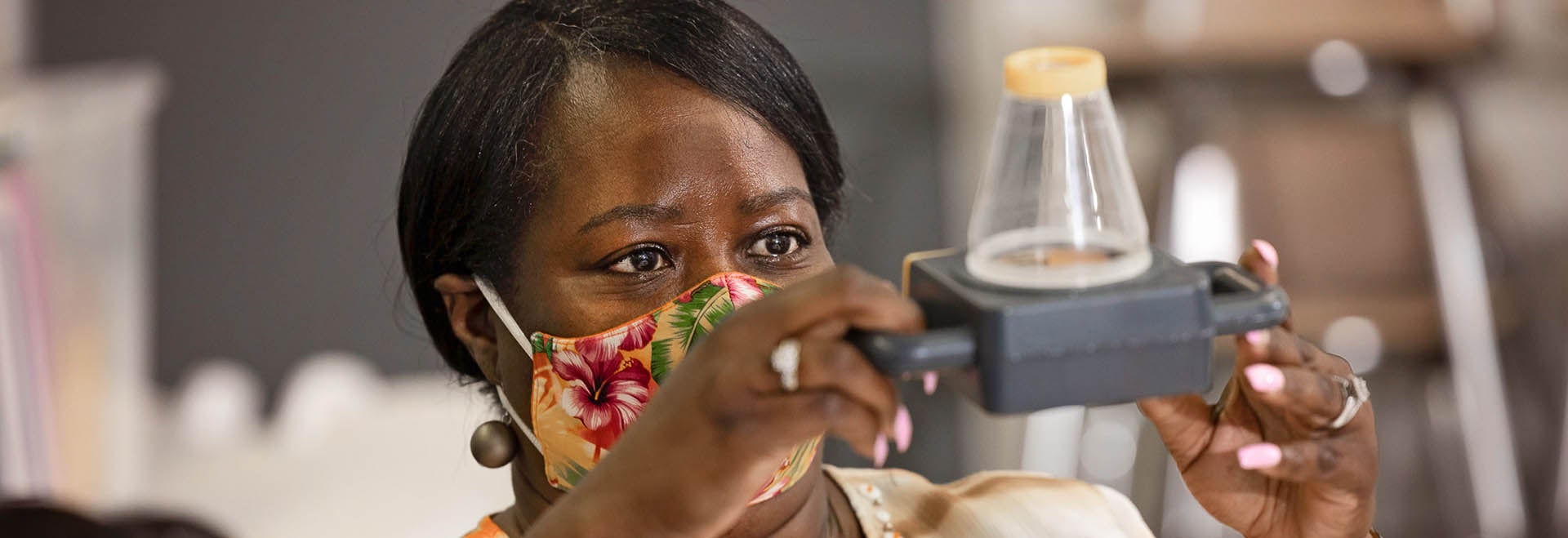
Valarie Lawrence looks at a pillbug in a magnifier.
